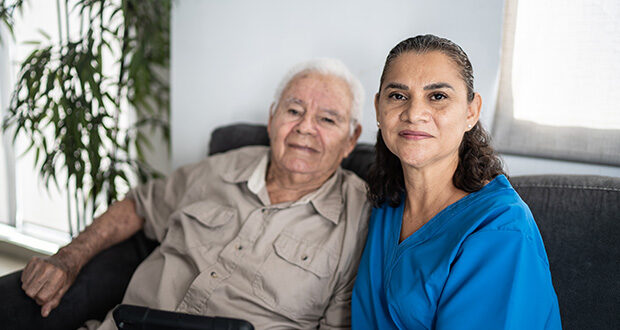An overwhelming majority of caregivers in Australia reported increased stress levels, isolation and a lack of support during the Covid-19 pandemic, according to recent survey.
Researchers from the Australian National University (ANU) looked at the perspectives of over a thousand people on caregiving and care work during the Covid-19 pandemic.
They found caregivers, especially women, faced higher stress levels and isolation and felt unsupported by their employers and the government.
Dr Laura Davy and Professor Ariadne Vromen from the Crawford School of Public Policy at ANU said many people took on care and support roles for the first time during the pandemic.
"We must shine a brighter spotlight on the crucial role of care work and the struggles faced by caregivers," professor Vromen said.
"The pandemic profoundly impacted the lives and wellbeing of paid care workers and people with unpaid caring roles in Australia.
"The crises of care experienced during the pandemic thrust care into the public limelight like never before."
During the height of the pandemic, paid care workers reported higher levels of stress, financial insecurity, and burnout.
One study found that nearly one in three direct aged care nurses experienced symptoms of depression, and over 36 per cent faced poor mental and physical health.
Unpaid care work was reported to be significantly higher during lockdowns, causing people to encounter challenges in balancing personal and work life, with some leaving the workforce.
Low salaries, poor employment conditions and low staffing numbers in the care industry also contributed to feelings of undervaluation and anxiety.
Similarly, the survey found that stress and isolation levels were the highest among female and young caregivers and people with demanding care responsibilities.
These groups faced more significant challenges accessing support from their employers and informal networks.
Professor Vrome said the 'invisibility of care work' and the difficulties faced by caregivers became particularly evident during the pandemic.
She said that, traditionally, caregiving is seen as a feminine responsibility and is a deeply rooted cultural conception that contributed to Australia's 'continued devaluation of care.'
"The increased feelings of isolation and disconnect from the community emphasised the hidden nature of care work that takes place behind closed doors.
"The lack of public discussion about care became apparent in the challenges people faced in accessing care services for their families during the pandemic.
"This highlights the flaws and emotional challenges associated with the current care system."
The report found that most Australians recognised the fulfilment and meaning of care work, but there was a clear consensus that pays and employment conditions needed to be better.
Most Australians, especially women and those with informal care roles, found paid care work fulfilling.
Nevertheless, few had favourable views on salary and working conditions in the sector.
Less than four in ten believed paid care work offered employment security, and three in ten considered it to provide fair work conditions.
Only one in five said it delivered good earnings.
Still, a quarter of respondents expressed interest in potential future care work, particularly among younger age groups and men.
"It's quite contradictory," Dr Davy said.
"There's a disconnect between the value people place on care work and the support provided to those working there.
"This contradiction highlights a significant issue that needs to be addressed."
Dr Davy said the survey's findings showed opportunities to address these issues through care-aware recovery strategies and investment in the care and support sector.
An overwhelming majority of respondents believed the government should primarily be responsible for funding aged care (90%) and disability support (93%).
Moreover, many carers reported they relied on a combination of formal services and support.
Nearly half of all carers in the study emphasised the importance of having a partner who shares care responsibilities and can work from home when needed.
This sentiment increased to three out of five among carers under 50.
Dr Davy said enhancing pay and conditions for care workers was crucial to meet future workforce demand, recruiting and retaining talent, and advancing gender equity in the sector.
"We need to have a national conversation about the social and economic value of care and the impact of political and industrial decisions on care workers," she said.
"It's crucial to prioritise the wellbeing of care workers and provide them with the support they deserve."
They also recommended more flexible work options, improved access to paid leave, and government investment in quality and affordable services.
Professor Vrome said these steps should foster a national conversation on the value of care and how to best support caregivers in managing their responsibilities.
"By addressing these issues, we can not only improve the working conditions for care workers but also improve the quality of care provided to vulnerable populations," she said.
Do you have an idea for a story?Email [email protected]
 Aged Care Insite Australia's number one aged care news source
Aged Care Insite Australia's number one aged care news source

